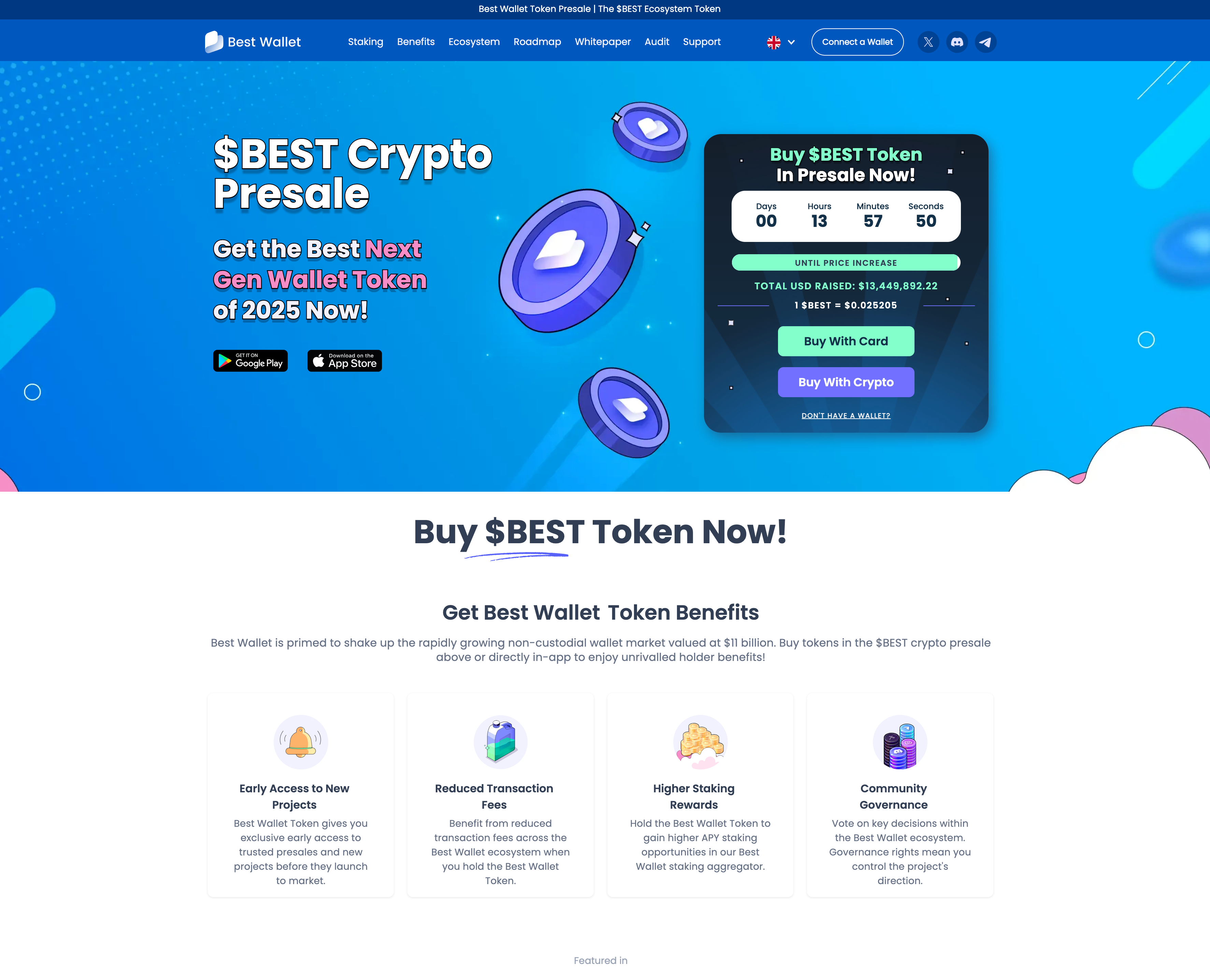The Best Wallet Tokens: A Comprehensive Guide
Introduction
In the ever-evolving world of cryptocurrency, the importance of secure and versatile wallets cannot be overstated. Wallet tokens have emerged as a crucial component of the cryptocurrency ecosystem, offering users a way to manage, store, and transact their digital assets securely. This article delves into the best wallet tokens available today, exploring their features, benefits, and use cases to help users make informed decisions about their crypto storage solutions.
Understanding Wallet Tokens
What Are Wallet Tokens?
Wallet tokens are digital assets that serve specific functions within cryptocurrency wallets. They can be used for various purposes, including transaction fees, staking rewards, and accessing premium features within wallet applications. Wallet tokens can enhance user experience by providing additional functionalities and incentives for holding and using a particular wallet.
Types of Wallet Tokens
- Utility Tokens: These tokens are used to access specific features or services within a wallet application. They may provide discounts on transaction fees or unlock premium features.
- Governance Tokens: Some wallet tokens grant holders voting rights in the development and management of the wallet platform. This allows users to have a say in the future direction of the wallet's features and services.
- Staking Tokens: Certain wallet tokens can be staked to earn rewards. Users can lock up their tokens in the wallet to help secure the network or validate transactions, earning passive income in return.
- Incentive Tokens: Wallets may offer tokens as incentives for users to perform specific actions, such as referring new users or engaging with the platform regularly.
The Best Wallet Tokens
1. Trust Wallet Token (TWT)
Overview: Trust Wallet is a popular mobile wallet that supports a wide range of cryptocurrencies. Its native token, Trust Wallet Token (TWT), enhances the wallet's functionality and user experience.
Features:
- Discounts on Transaction Fees: TWT holders can enjoy reduced fees when using the Trust Wallet DApp browser for transactions.
- Incentives for Users: Users can earn TWT tokens by participating in various activities within the wallet, such as referrals or engaging with the community.
- Governance: TWT holders have a say in the development of the Trust Wallet platform, allowing them to influence future features.
Use Cases:
- Staking TWT tokens to earn rewards within the Trust Wallet ecosystem.
- Using TWT to reduce transaction fees when swapping tokens or engaging with DApps.
2. Binance Coin (BNB)
Overview: Binance Coin (BNB) is the native cryptocurrency of the Binance exchange and is also utilized within the Binance Smart Chain ecosystem. BNB has become a popular wallet token due to its versatility.
Features:
- Transaction Fee Discounts: Users can pay for trading fees on the Binance exchange with BNB at a reduced rate.
- Staking Opportunities: BNB can be staked in various DeFi applications and wallets to earn passive income.
- Access to Exclusive Features: Holding BNB may provide access to exclusive token sales and other benefits within the Binance ecosystem.
Use Cases:
- Using BNB to pay transaction fees on the Binance exchange and Binance Smart Chain.
- Staking BNB in wallets or DeFi platforms to earn rewards.
3. Ethereum (ETH)
Overview: While primarily known as a cryptocurrency, Ethereum (ETH) also functions as a wallet token within various decentralized applications and wallets. Its extensive use cases make it a valuable asset for any crypto user.
Features:
- Gas Fees: ETH is used to pay transaction fees (gas) on the Ethereum network, making it essential for interacting with any DApp or smart contract.
- Staking: With Ethereum's transition to a proof-of-stake model, users can stake their ETH to earn rewards.
- Governance Participation: Holding ETH can grant users a voice in governance decisions within various DeFi projects built on Ethereum.
Use Cases:
- Utilizing ETH to interact with decentralized applications, DeFi protocols, and NFT marketplaces.
- Staking ETH to participate in Ethereum 2.0 and earn rewards.
4. Coinbase Token (COIN)
Overview: While Coinbase doesn’t have a native token like some other platforms, it offers a unique utility through its platform, allowing users to earn rewards in various cryptocurrencies.
Features:
- Staking Rewards: Users can stake certain cryptocurrencies directly within their Coinbase wallets to earn rewards.
- Educational Incentives: Coinbase offers users the chance to earn crypto by learning about different cryptocurrencies and completing quizzes.
Use Cases:
- Earning rewards by staking supported cryptocurrencies within the Coinbase wallet.
- Participating in educational programs to earn various tokens.
5. MetaMask Token (MMT) (Hypothetical)
Overview: While MetaMask does not currently have its own token, a hypothetical MetaMask Token (MMT) could offer significant benefits given the wallet's popularity in the Ethereum ecosystem.
Features:
- Gas Fee Discounts: MMT could provide discounts on transaction fees for users interacting with Ethereum-based DApps.
- Governance Rights: MMT holders could influence the development and features of the MetaMask wallet.
- Incentives for Users: Users could earn MMT through referrals and participation in community events.
Use Cases:
- Using MMT to reduce transaction fees or access premium features in the MetaMask wallet.
- Participating in governance decisions regarding the wallet's future.
6. Polygon (MATIC)
Overview: Polygon (formerly Matic Network) is a layer-2 scaling solution for Ethereum that aims to improve transaction speeds and reduce costs. The MATIC token plays a crucial role within the Polygon ecosystem.
Features:
- Transaction Fees: MATIC is used to pay for transaction fees on the Polygon network, making it essential for users interacting with dApps.
- Staking Rewards: Users can stake MATIC to help secure the network and earn rewards in return.
- Governance: MATIC holders can participate in governance decisions, influencing the development of the Polygon ecosystem.
Use Cases:
- Paying transaction fees for using dApps built on the Polygon network.
- Staking MATIC tokens to earn rewards while contributing to network security.
7. Avalanche (AVAX)
Overview: Avalanche is a high-performance blockchain platform designed for decentralized applications and custom blockchain networks. Its native token, AVAX, serves multiple purposes within the ecosystem.
Features:
- Transaction Fees: AVAX is used to pay for transaction fees on the Avalanche network.
- Staking: Users can stake AVAX to earn rewards while participating in the network's consensus mechanism.
- Governance: AVAX holders have voting rights in governance decisions affecting the Avalanche ecosystem.
Use Cases:
- Utilizing AVAX to pay transaction fees and access various decentralized applications on the Avalanche network.
- Staking AVAX for passive income and network participation.
8. Ripple (XRP)
Overview: Ripple (XRP) is a digital asset designed for fast and low-cost international money transfers. While not a wallet token per se, XRP plays a critical role in facilitating transactions on Ripple's network.
Features:
- Transaction Fees: XRP is used to pay transaction fees on the Ripple network, enabling quick and low-cost transfers.
- Liquidity Provision: XRP can be held and used to provide liquidity for cross-border transactions.
Use Cases:
- Using XRP to facilitate international money transfers and remittances through Ripple’s network.
- Holding XRP as an investment while benefiting from its utility in the Ripple ecosystem.
Factors to Consider When Choosing a Wallet Token
1. Security
When selecting a wallet token, security should be a top priority. Look for tokens associated with reputable wallets that have a strong track record of protecting user assets.
2. Utility
Consider the utility of the token within its respective ecosystem. Tokens that offer multiple use cases, such as transaction fee discounts, staking rewards, and governance rights, provide added value to users.
3. Community Support
A strong community can contribute to the success and development of a wallet token. Look for tokens that have active communities and ongoing development efforts.
4. Regulatory Compliance
As regulations surrounding cryptocurrencies evolve, ensure that the wallet token you choose complies with relevant regulations. This can help mitigate risks associated with regulatory scrutiny.
5. Market Liquidity
Tokens with higher liquidity are easier to buy and sell. When choosing a wallet token, consider its trading volume and market capitalization to ensure you can easily access your funds when needed.
Conclusion
Wallet tokens play a pivotal role in enhancing the user experience within the cryptocurrency ecosystem. By providing utility, security, and community engagement, these tokens empower users to manage their digital assets effectively. Whether you’re using Trust Wallet Token, Binance Coin, or exploring new and innovative options, understanding the features and benefits of these wallet tokens is essential for making informed decisions in your cryptocurrency journey.
As the cryptocurrency landscape continues to evolve, staying informed about the best wallet tokens will help you maximize your potential and navigate the complexities of digital finance. Embrace the opportunities that wallet tokens offer, and take charge of your financial future in the exciting world of cryptocurrency.
Made in Typedream
